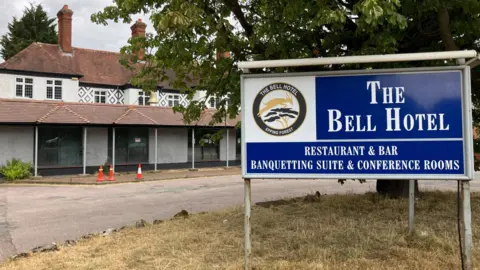A recent incident has drawn significant attention, particularly concerning migrant housing and related tensions. A man, residing at The Bell Hotel in Epping, Essex, has been charged with several offences, including sexual assault. The individual in question, identified as 32-year-old Mohammed Sharwarq, hails from Syria and has been in the UK as part of the country’s asylum-seeking process.
In detail, the charges against Sharwarq consist of two counts of common assault, four counts of assault by beating, and a more serious allegation of sexual assault against another male. The incidents reportedly took place within a specific timeframe, from July 25 to August 12. His arrest on Tuesday was conducted by Essex Police, who subsequently placed him in custody. Authorities have stated that they are not in pursuit of any additional suspects related to the case, which feeds into the broader concerns surrounding the safety and security within migrant accommodations.
The Bell Hotel itself has become a focal point in the ongoing debate around the treatment of asylum seekers in the UK. Over recent weeks, it has been the venue for numerous protests, particularly spurred on by opposition to the government’s policies regarding the housing of asylum seekers. This hotel, a choice made by the Home Office, has hosted various individuals fleeing conflict and persecution in their home countries. However, the increasing visibility of tensions around such accommodations has sparked nationwide discussions around immigration policy, community safety, and the responsibilities of local governments.
As public sentiment continues to evolve, these protests often reflect a mix of perspectives, from those advocating for humanitarian aid and asylum rights to groups expressing concerns over local safety and resources. The intersection of such complex socio-political factors has left communities divided, with some residents advocating for the rights of migrants to find refuge and others emphasizing community safety and resources. The implications of these protests extend beyond the immediate locality, prompting wider discussions about immigration, integration, and social cohesion in the UK.
The charges against Sharwarq serve as a stark reminder of the challenges associated with running housing programs for vulnerable populations. It raises essential questions about how best to ensure the safety of both the housed individuals and the broader community. Reports indicate that accession to necessary support systems and safeguarding measures for migrants may need reevaluation to address ongoing security and social integration concerns.
As the legal processes unfold, the case will likely garner further media coverage and public scrutiny. In the meantime, the community and local authorities continue to navigate the complex landscape of public opinion regarding immigration. Issues related to asylum seekers are likely to remain in the spotlight, requiring careful management by both government officials and community leaders to ensure that responses to such incidents are balanced, fair, and conducive to fostering a safe environment for all residents.
In summary, while Mohamad Sharwarq’s charges are serious and highlight specific risks, they also reflect the broader climate of socio-political tension regarding migrants in the UK. The response to such incidents will be vital in shaping future policies and community relations, as stakeholders from various backgrounds contemplate the complexities surrounding asylum, safety, and integration. As the case progresses, community engagement and dialogue will be critical in creating a consensus that respects both humanitarian principles and local community needs.











